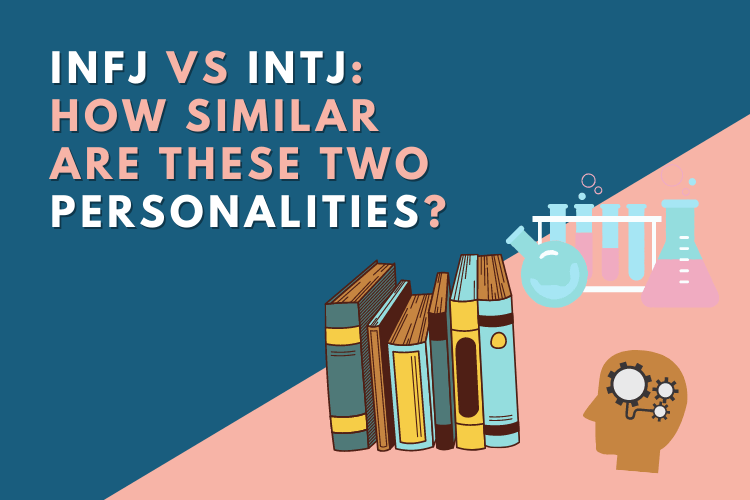 Although INFJs and INTJs share three out of four categories in the Myers-Briggs personality system, the types are quite different.
Although INFJs and INTJs share three out of four categories in the Myers-Briggs personality system, the types are quite different.
Both are rare personality types with some common characteristics, but a few notable differences dramatically change the way INFJs and INTJs experience the world.
If you’re an INFJ or an INTJ, understanding the distinctions between these personality types can help you better understand yourself.
INFJ Overview
INFJs possess introverted, intuitive, feeling, and judging characteristics. Combining these traits leads to a strong sense of idealism, so INFJs are passionate about advocacy and justice. However, they tend to be thoughtful and intelligent, so they can see the concrete steps they should take to achieve their own goals and make the world a better place.
INFJs are very sensitive, emotional, and empathetic. Not only do they experience their own emotions intensely, but they also can feel an intense connection with others.
For example, they feel personally touched when they see injustice, which is why they feel such a strong pull toward helping others.
Because INFJs focus so strongly on achieving an ideal world, they tend to neglect themselves. As a result, it’s not uncommon to see INFJs going through burnout or compassion fatigue.
Some INFJs are also highly sensitive to criticism, especially when it comes to their worldview or their core principles, so they may experience emotional turmoil when others challenge them.
INTJ Overview
The four characteristics behind the INTJ personality type are introverted, intuitive, thinking, and judging. In addition, INTJs possess logical and creative skills that make them highly intelligent, thoughtful and driven.
This personality type has a unique ability to see beyond the surface and understand how the world works.
INTJs are not afraid to dive into the details of a situation, and they’re motivated by a thirst for knowledge.
INTJs learn quickly and are good at teaching themselves about the topics that interest them, so they tend to be well-versed in many areas.
Curiosity drives INTJs, but this can also lead to frustration with the status quo. When they see inconsistencies in the rules or expectations of the world, they want to challenge them.
INTJs tend to be impatient with people or situations that force them to adhere to rules that they believe are illogical or unnecessary.
Dominant Function: Introverted Intuition
Your dominant function is the main characteristic you use to interpret the world and guide your decisions. INFJs and INTJs share the same dominant function: introverted intuition.
Because this is an introverted trait, both INTJs and INTJs tend to be focused more on their internal process than on their external environment. They are less concerned with the physical, tangible world and more concerned with ideas and concepts.
People with introverted intuition are more likely to focus on the future than on the past or present.
So while INFJs and INTJs do have the ability to analyze and understand current or past events, they’re more interested in using their intelligence to set and achieve future goals.
Auxiliary Function: Extroverted Feeling vs. Extroverted Thinking
Your auxiliary function is second-in-command to your dominant function. It serves to balance out the dominant function so that you’re not constantly driven by just one facet of your personality.
INTJs and INFJs have different auxiliary functions, which is why the two types have their fundamental differences.
The auxiliary function for INTJs is extroverted thinking, and the auxiliary function for INFJs is extroverted feeling. Because both are extroverted traits, the auxiliary functions for both personality types influence how you behave and make decisions in the external world.
INTJs are thinkers, so they rely primarily on facts and logic to guide their choices.
INFJs, on the other hand, are feelers, so they use their values to make decisions.
While INTJs set their values and opinions aside to make the most logical choices, INFJs do not separate themselves from their actions.
Competitiveness
INTJs and INFJs are both driven and goal-oriented personality types. They can see the path to greatness for themselves as individuals and the whole world, and they know the steps needed to get there.
However, INTJs often have a more competitive edge than INFJs.
The typical INFJ is highly sensitive to criticism or rejection from others. Because of their sense of empathy and emotional intuition, they’re notorious people-pleasers.
Even if an INFJ feels strongly convicted of an idea on the inside, they may hesitate to confront someone who disagrees with them directly.
INFJs prefer to quietly and independently work toward their sense of justice than argue with individuals who feel differently.
INTJs, on the other hand, love a spirited debate. This trait comes from their extroverted thinking function. They believe that discussing their ideas out in the open is the key to progress, so they don’t shy away from conflict.
In addition, INTJs are great at constructing arguments, which makes them skilled debaters. This personality type also isn’t afraid of criticism, so they won’t sugar-coat their beliefs to get approval from others.
Emotional Vulnerability
Understanding and expressing one’s emotions is essential for an INFJ. This personality type is highly in tune with their own emotions, and they’re skilled at picking up emotional cues from other people.
They listen to their emotional instincts when making decisions, and they find value in vulnerable moments. While they do have logical intellect as well, their priority is their emotional life.
INTJs aren’t as comfortable with expressing strong emotions. Logic and reason are the most critical elements of decision-making for an INTJ, so they’re much less likely than an INFJ to think deeply about their feelings.
They experience the full range of human emotion on the inside, but they tend to be uncomfortable expressing these feelings externally. When talking with others, they’d instead focus on the facts.
Straightforwardness
Because of their emotional differences, INTJs and INFJs also have very different communication styles.
INTJs are reasonably candid and straightforward in the way they speak. They know what they want, and they know the best way to achieve it.
Efficiency is one of their top priorities, so their conversations are precise and to the point. INTJs don’t get offended when others are blunt with their communication. For the most part, they leave their emotions out of the conversation, so they have a natural safeguard against criticism.
INFJs aren’t as direct with their communication. They like to make strong connections with others, and they tend to over-analyze how their words or actions may affect people.
These traits make INFJs great sources of emotional support and guidance. However, INFJs may struggle to advocate for themselves if they disagree because they don’t want to engage in conflict.
As a result, INFJs tend to be very careful in how they communicate to maintain a good relationship with everyone and cause no offense.
Solitude and Independence
INFJs and INTJs are both introverts, so they feel energized from spending time alone. This trait doesn’t mean that they don’t need social interaction, though.
On the contrary, INFJs, in particular, are known to seek out close friendships. They care deeply about others’ well-being, and they love to connect with people on an emotional level.
They may not like to be the center of attention at a party or have constant contact with acquaintances, but you can expect INFJs to have a core group of close friends with whom they have meaningful relationships.
INTJs may have a more challenging time maintaining close friendships. Unlike INFJs, they don’t often feel compelled to find companions.
They may feel happy with just a few acquaintances in their circle, and they may value their independence over their relationships.
Idealization
INFJs and INTJs can be idealists as they are deep thinkers and envision solutions to large problems. However, INFJs are more likely to idealize people than INTJs, especially people they look up to.
In addition, INFJs are highly emotionally intuitive, so it’s effortless for them to feel close to others. When they truly understand a person at their core, they can feel utterly enamored with them.
While this makes an INFJ’s relationships very meaningful and passionate, it can lead to serious emotional turmoil at the end of a friendship or romantic relationship.
INTJs usually have a more realistic understanding of the people in their lives. Because they’re so observant and logical, they see a balanced image of the good and the bad in everyone.
Of course, problems in relationships are still painful, but INTJs don’t take things as personally as INFJs.
Common Questions About INFJs and INTJs
Many people who are unsure of their personality type wonder whether they’re an INFJ or an INTJ. If your personality is somewhere in between the two types, you might also have some questions.
The following are the most common questions people ask when learning about the differences between INFJs and INTJs:
Which Is Better: INTJ or INFJ?
One personality type is never better than the other. Each of the 16 Myers Briggs types has a different perspective on life and different priorities.
INTJs and INFJs have some shared strengths and weaknesses as well as some unique gifts and struggles.
If you consider yourself an emotional, sensitive person, you might find that you get along better with INFJs. On the other hand, if you prefer more straightforward people, you might be drawn to INTJs.
Certain careers may be better suited to INFJs, while others are perfect for INTJs. Neither one is better, but each personality type can apply its different strengths to different situations.
Which Is Rarer: INFJ or INTJ?
INFJ and INTJ are two of the rarest personality types, but INTJs are slightly more common. According to the Myers & Briggs Foundation, INFJs make up 1.5 percent of the population, and INTJs make up 2.1 percent.
Both types may be so rare because of the unique combination of attributes they possess.
Are INTJs and INFJs the Same?
INTJs and INFJs are not the same. However, they do share three out of four categories, and they have the same dominant function. So, in many ways, INTJs and INFJs are similar, especially when it comes to internal thought processes.
Some key differences can make the two personality types appear very different on the outside, though.
INTJs are straight talkers who see the exact path to their goal and don’t hesitate to work toward it.
On the other hand, INFJs are passionate, sensitive individuals who strive to make the world better but can be limited by fear of conflict.
The two differ most notably in their communication styles, which is why INFJs and INTJs can seem so different on the outside despite their similarities.
Are INFJs the Smartest?
INFJs and INTJs are both known for being highly intelligent. They’re observant and rational, so they can easily pick up on patterns and details that give them great insight into specific situations and the world overall.
Of course, one personality type isn’t more intelligent than the other, but they possess different kinds of intellect.
INFJs have good intuition and strong emotional intelligence, so they’re brilliant in understanding others. They tend to give great advice, and they’re good at predicting what people will do in the future.
So even if a friend doesn’t tell an INFJ precisely what they’re feeling, the INFJ will likely pick up on subtle cues and figure out what’s going on.
INTJs are often academically intelligent. They have a thirst for knowledge and understanding that drives them to learn about a wide variety of topics, and they learn quickly and retain information effectively.
Moreover, because they value logic and can analyze situations objectively, they’re also great problem solvers.
—
INFJ and INTJ are two fascinating personality types. They’re not easy to understand, but they’re thoughtful, interesting, and motivated people.
The two share many similarities, but their differences are just as notable.
If you’re an INFJ or an INTJ, you can use the information you learn about your personality type to discover more about yourself and how you relate to the world.


